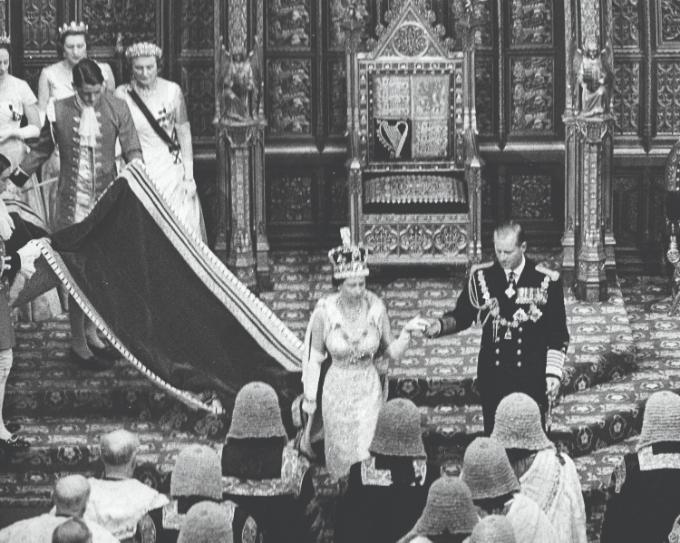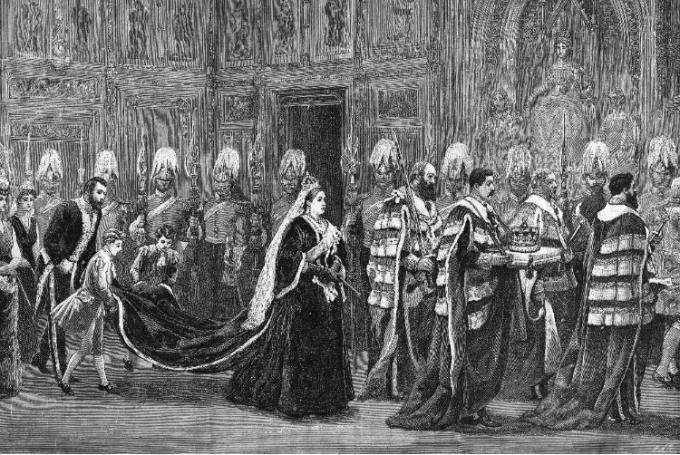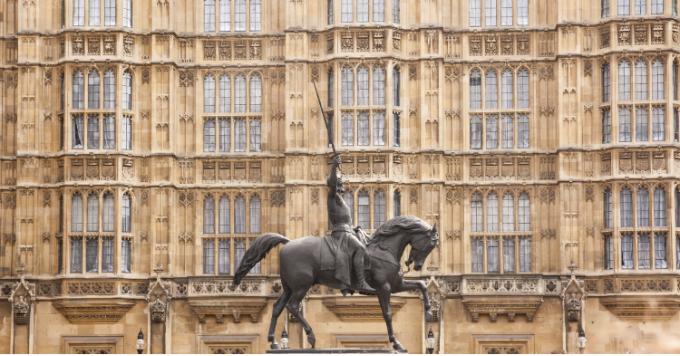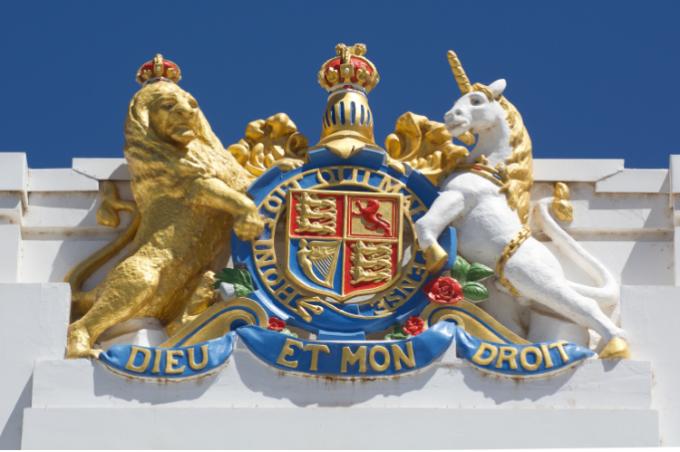Crowning glory: monarch, politics and Parliament in an age of democracy
The Queen and Prince Philip at the State Opening of Parliament 1998
16 min read
“The more democratic we get,” Walter Bagehot predicted in 1867, “the more we shall get to like state and show, which have ever pleased the vulgar.” The outpouring of tributes triggered by the death of the Duke of Edinburgh indicates that Bagehot was right.
Universal suffrage has not, as some intellectuals expected, proved incompatible with monarchy. Nor is it only among “the vulgar,” as Bagehot referred to the wider public, that the urge to mark the duke’s passing has been felt. In the Commons, 136 members put down their names to speak about him, as did 90 peers.
Ian Blackford, for the SNP, recalled the duke’s advice on the length of speeches, “which I dare say some Members might even think applies to myself”, namely: “The mind cannot absorb what the backside cannot endure.” But the speeches, though numerous, were short, and most of them mentioned some encounter with the duke. He had met an astonishing number of parliamentarians. The Queen has met even more.
One of the greatest dangers for any ruler is isolation: simply not knowing what is going on outside the palace gates
These encounters can not be reduced to some constitutional theory. They are a matter of practice. One of the greatest dangers for any ruler is isolation: simply not knowing what is going on outside the palace gates. Many pPrime Ministers ministers cease, after a time, to know what is going on outside the Downing Street gates. How much greater the risk of isolation if one has been on the throne for nearly 70 years?.
In a free country, the gathering of information can not be left to the secret police. Nor is it wise to leave it entirely in the hands of the free press, which is more than capable of error. There is no substitute for conversation with as wide a range as possible of people who might have some idea of what is going on.
Some of these conversations will be horribly stilted: hence the duke’s attempt to break the ice, and produce a more relaxed and candid atmosphere, by telling jokes which were hard to distinguish from gaffes, especially when the task of drawing that distinction lay with journalists who were themselves under intense pressure from their news desks to produce stories.
But the Queen possesses, in her conversations with parliamentarians, an enormous advantage. As Sir John Major recently said of the weekly audiences she holds with her prime minister: “They are utterly private, so it is an opportunity for both parties to speak in total frankness to one another. And in politics, except with people who are extraordinarily close, it is very difficult to do that, and so it’s a great outlet when prime minister and monarch can meet.”
The Queen’s father, George VI, confided to his diary that Winston Churchill, his wartime prime minister, “tells me, more than people imagine, of his future plans and ideas and only airs them when the time is ripe to his colleagues and the chiefs of staff.”
The Queen has accepted her role as a matter of duty
But it would be a mistake for any monarch to rely solely on the prime minister for an appreciation of what is going on. Fortunately, our arrangements offer many other opportunities for conversation. Sir Oliver Letwin, one of David Cameron’s closest advisers from 2005 to -16 and for the last two years of that period Chancellor of the Duchy of Lancaster, told The House magazine:
“The Chancellor of the Duchy of Lancaster doesn’t have very many duties - but the office does cause the holder to have conversations with the Queen from time to time, in connection with various ancient ceremonies. What comes through in such conversations is her matchless ability to combine the regal with the personal. She has seen innumerable politicians come and go; but, despite the vast gulf in grandeur, age and experience, she somehow manages to make you feel that she recognises an equivalent centre of self, and that you are being allowed for a few priceless moments to share in a millennial heritage that is to her perfectly natural.”
And here is Andrew Mitchell, describing his swearing in as a Privy Counsellor in 2010, the day after he became international development secretary in the newly formed Conservative/Lib Dem coalition government. The procedure is to kneel in front of the Queen, swear an oath and kiss her hand without actually touching it: “I got rather carried away by the moment and landed a smacker on her gloved fingers. William Hague said in a stage whisper, ‘You’re supposed air kiss her hand, not give it a great kiss.’”
The monarchy commands general acceptance because it gives us things democratic politics can not supply
Labour politicians generally derive as much enjoyment as Conservatives from describing their meetings with the Queen. Here is Chris Mullin, MP for Sunderland South from 1987 to 2019, in his diary for Wednesday 26 June 2002: “George Foulkes, who has just been made a Privy Counsellor, tells the following tale. Some time ago Clare Short and Mo Mowlam were attending upon the Queen when Clare’s pager started vibrating. Clare surreptitiously checked the message. Whereupon Her Majesty looked up and inquired, ‘Someone important?’”
Mullin himself strives, as a good left-winger should, to avoid being seduced by the British Establishment. Only after 13 years in Parliament does he witness some of the ceremonial surrounding the State Opening, when the Queen comes down from Buckingham Palace to the House of Lords and reads from the throne the speech written for her by the government of the day:
“Her Majesty was still on the premises when I arrived so I tarried at St Stephen’s entrance to watch her depart. Whatever one thinks of our ruling class, they do a good line in State occasions. Long lines of ramrod-straight Guards in blue coats and busbies; a resplendent herald in yellow and scarlet; four troops of Horse Guards in gleaming helmets (and moving incongruously among them, workmen in yellow jackets labelled Onyx, scooping up the droppings). Open-topped carriages manned by flunkies in tricorn hats… And in the final carriage the unmistakeable figure of Tommy McAvoy [a Labour whip] in top hat and tails, beaming from ear to ear. Apparently one of the whips (Graham Allen) is left at the Palace as a hostage against HM’s safe return and Tommy has to go and collect him. If Tommy were the hostage, there would be more than a few votes for leaving him in the royal dungeons.”
The Queen possesses, in her conversations with parliamentarians, an enormous advantage
The daily letter written to the Queen by one of the whips is another example of how the links between the monarch and parliamentarians are much more extensive than one might think if one reads some of the theoretical accounts, in which the emphasis is usually on the Crown’s impotence.

Those accounts are not wrong. They are just incomplete. The Crown has indeed surrendered pretty much all the powers and the patronage it once possessed to the Government government of the day. But it would be an error to look back to a period when the Crown did not have to worry what anyone else thought. As Lord Sumption, among other things a historian of the Hundred Years’ War, remarked in an address to the Friends of the British Library to mark the 600th anniversary of Magna Carta: “Medieval kings could not govern without the tacit support of their subjects, and the active support of at least the most powerful of them. Medieval governments depended for their survival on an unstable mixture of sentiment, legitimacy and bluff, in the same way that most governments did until comparatively modern times. This meant that kings could not afford to act in a way that defied the contemporary consensus about how a king should behave. One of the key elements of that consensus was that the king should act in accordance with law.”
Charles I defied the consensus about how a king should act, and paid for it with his life. His second son, James II, likewise defied that consensus, by seeking to convert the country to Roman Catholicism, and paid for it by being thrown out of England in 1688.
He was replaced by William of Orange, who was not only a grandson of Charles I and married to James II’s daughter, Mary, but had the decisive merit of being a Protestant, so therefore, Parliament and the wider public were assured, a defender of liberty.
William and Mary had no heirs. Nor did her sister, Queen Anne. Parliament therefore decided to instal, on the British throne, the House of Hanover, which had the aparently transcendent merit of being Protestant, meaning it took precedence over the many Roman Catholics with better hereditary claims.
From 1714, when the first of the Hanoverians, George I, ascended the throne, Britain had a parliamentary monarchy: a development already implicit in the Glorious Revolution of 1688, and indeed in the beheading in 1649 of Charles I.
As Parliament grew in power, the sovereign withdrew and began to be seen as "above politics"
It is difficult, in relating these events, to avoid striking a Whiggish note, as if our nation’s history were emphatically the history of progress. Democrats who celebrate the widening of the franchise from 1832 to 1928 likewise celebrate progress, understood as the bringing of equality at the ballot box first to all adult males, and then to all women too.
That is true, but again, it is not the whole truth. If it were, we would no longer have a monarchy, and would not now be celebrating the contribution made to our nation by “a discredited Balkan prince of no particular merit or distinction,” as the duke once described himself.
Our constitution is not only the product of egalitarian ideals, sacred though those are. It also springs from our history, which cannot be subjected to a single idea, however noble. The story is more complicated than that.
In the 18th century, we congratulated ourselves on possessing a mixed constitution, consisting of King, Lords and Commons, each part checking the others and helping to guarantee our ancient liberties. Nobody now talks like that. Even Jacob Rees-Mogg suggests that sovereignty lies with the people, and is merely delegated to Parliament.
And yet we glimpse from time to time that this can not be the whole truth; that the unfettered rule of the people might be as intolerable as the unfettered rule of a king. “Populism” is the word now used to condemn this modern form of despotism. John Stuart Mill called it the tyranny of the majority.

We are brought back to Sumption’s defence of the rule of law. No majority should be able to overturn that. There has to be some power capable of standing up to the majority.
It may seem anachronistic, in this context, to suggest the monarchy as a countervailing power. After all, the monarchy has been in retreat for centuries. David Cannadine has described (in a brilliant essay in The Invention of Tradition, a volume edited by Eric Hobsbawm and Terence Ranger) how the British monarchy adapted itself in the period 1820 to -1977 to modern conditions.
The British monarchy used to be a somewhat slovenly institution. As late as 1860, Lord Robert Cecil, who as Lord Salisbury would go on to serve for almost 14 years as prime minister, wrote after watching Queen Victoria open Parliament: “Some nations have a gift for ceremonial. No poverty of means or absence of splendour inhibits them from making any pageant in which they take part both real and impressive. Everybody falls naturally into his proper place, throws himself without effort into the little drama he is enacting, and instinctively represses all appearance of constraint or distracted attention.”
And yet, Lord Robert went on, “This aptitude is generally confined to the people of a southern climate and of non-Teutonic parentage. In England the case is exactly the reverse. We can afford to be more splendid than most nations; but some malignant spell broods over all our most solemn ceremonials, and inserts into them some feature which makes them all ridiculous.”
When Edward VII succeeded his mother, Queen Victoria, in 1901, he realised this would no longer do. Britain was being outshone in the ceremonial by rivals such such as Germany, Austria and Russia, and in the age of photography, British blunders could be captured and put on millions of breakfast tables by such publications as the Daily Mail, founded in 1896.
We feel reassured by a source of authority that does not change every few years
The coronation of Queen Victoria in 1838 had been a dreadful mess. Democracy demanded higher standards. The Anglican clergy got their act together, Elgar composed sublime music, and new and grander royal carriages were constructed even as the motor car entered on its long ascendancy.
As Cannadine reminds us, Edward VII revived the State Opening of Parliament as a full-dress ceremonial occasion, with a procession in the state coach through the streets of London, something Victoria had not done in 40 years. In 1910, when Edward died, he lay in state in Westminster Hall, “an innovation which proved extremely popular”. Much of the ceremonial which we now think of as ancient was invented by this monarch and by Lord Esher, who provided the organisational brio, with the press quick to popularise, as a happy change from Victorian gloom, the glorious new pageantry.
Democracy demanded, and got, higher standards than the oligarchy had required of itself. The Queen’s coronation in 1953 was rehearsed in exhaustive detail, and then staged as the first great spectacle of the television age. As the Duke of Edinburgh rightly contended in Canada in 1969:
“It is a complete misconception to imagine that the monarchy exists in the interests of the monarch. It doesn’t. It exists in the interests of the people.”
Clement Attlee, prime minister from 1945 to 51, had recognised that there was no need to abolish the monarchy in order to introduce socialism. For as he himself put it, in an article written in 1959,
“the greatest progress towards the democratic socialism in which I believe has been made not in republics but in limited monarchies. Norway, Sweden and Denmark are probably the three countries where there is the highest degree of equality of well-being.”

In Attlee’s view, “A monarch is a kind of referee, although the occasions when he or she has to blow the whistle are nowadays very few…
“The monarchy attracts to itself the kind of sentimental loyalty which otherwise might go to the leader of a faction. There is, therefore, far less danger under a constitutional monarchy of the people being carried away by a Hitler, a Mussolini or even a de Gaulle.”
Here is the greatest modern function of the British monarchy. It has very little power: that is the prize for which the political parties compete. But the Crown is not as devoid of functions as commentators obsessed with power, and oblivious to other considerations, tend to imagine. Any would-be tyrant would have to overthrow the monarch, to whom the armed forces and other organs of the state continue to swear allegiance. The point of our “hereditary grandmaster of the ceremonies” (as Frederic Harrison described the monarch in 1875) is to keep mere politicians in order.
The monarchy commands general acceptance because it gives us things democratic politics can not supply. We feel reassured by a source of authority that does not change every few years at an election. Our politicians are by their nature transitory. We invite them to go through the sordid process of soliciting our votes by promising to solve our problems, and within a few years we condemn them for letting us down, and kick them out.
We have kicked unsatisfactory monarchs out too, most recently in 1936. But as Parliament grew in power, the sovereign withdrew and began to be seen as “above politics”. By a mixture of accident and design, our monarchs conducted, one might say, a brilliant political manoeuvre. The king or queen continues to represent us, without having to stand for election.
This does not square with democratic theory, according to which legitimacy springs from getting most votes. But it does square with human nature, which requires a person on whom to focus our deepest loyalties. And in some ways it is easier, one might even say fairer, if that person has been chosen by accident of birth, than by some supposedly meritocratic process which is monopolised by a gang of scrabbling careerists.
Many members of the wider public hate politicians, considering them to be a lot of crooks who are “all the same”. By soliciting votes, and making promises which they can not keep, they have demeaned themselves. How much easier the hereditary principle is to accept. It relieves the monarch of the accusation of having set out to obtain the highest position in the state. The Queen has accepted her role as a matter of duty. Like her father and grandfather before her, she is a conscientious monarch, dedicated to the welfare of her subjects.

However objectionable the hereditary principle may be in strict democratic theory, it is in practice widely observed, for most of us hope to pass on whatever possessions, abilities and manners we may possess to our children.
We are interested in the monarch’s family in a way we are seldom interested in the family of a politician. For this family unites us with someone far above us in the hierarchy. We too are born and marry and die. Here is a way in which without boasting we can consider ourselves related to the Rroyal Ffamily, condemned as we are to a common human fate. As Bagehot remarked,
“A family on the throne is an interesting idea… A princely marriage is the brilliant edition of a universal fact, and, as such, it rivets mankind.”
Opinion polls indicate that the monarchy does not attract the same level of support from the young as it does from the old. Among the young there is more sympathy for Meghan Markle, who soon found life as a British royal intolerable. In the nation as a whole, the dutiful conduct of the Duke of Edinburgh commands more admiration.
Who can tell what will happen next? I for one confess that I do not know. But almost all of us know what we would like to happen next. We would like the British monarchy to continue as the guardian of our liberties and our constitution, by ensuring that those scurvy politicians never get above themselves.
Andrew Gimson is the author of Gimson’s Kings & Queens: Brief Lives of the Monarchs since 1066.
